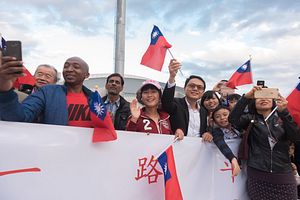For Taipei, the question of U.S. reliability is an existential matter. Beijing is pressuring Taiwan’s pro-independence Democratic Progressive Party, hinting at the use of force if necessary to achieve unification with the island. This is no time for America to go wobbly on support for democratic Taiwan.
U.S. President Donald Trump’s penchant for unpredictability and the smattering of prominent voices in academe suggesting that the United States should barter Taiwan for other concessions ensure that China will keep probing the limits of America’s political resolve. But regarding Taiwan as a bargaining chip would be antithetical to the U.S. national interest.
Fortunately, there is remarkable bipartisan support for strengthening U.S.-Taiwan relations, if only as a response to President Xi Jinping’s ambition to secure China’s central position in the world order. The Taiwan Travel Act, which Trump signed into law in March, supports closer official U.S.-Taiwan engagement at all levels. Likewise, the 2019 National Defense Authorization Act urges the United States to participate in “appropriate Taiwanese military exercises, such as the annual Han Kuang exercise” and encourages high-level defense and military exchanges.
As Washington dials up pressure on Beijing, mainly to address unfair Chinese investment practices and leeching of U.S. intellectual property, it should not view Taiwan simply as a lever in its diplomatic toolkit. Instead, it should advance an affirmative vision, strengthening Taiwan’s ability to compete economically and militarily for the long term and remain a bastion of democracy in the Chinese-speaking world.
Taiwan could become collateral damage in an open-ended and multifront trade war. Taiwan is already enduring steel and aluminum tariffs, and subsequent rounds of a trade spat with China could end up squeezing Taiwanese firms dependent on providing spare parts for mainland-manufactured smartphones and computers. A deepening trade war would also exacerbate some other detrimental trends, such as Beijing’s pursuit of the Made in China 2025 initiative to achieve greater indigenous innovation and semiconductor sovereignty.
Viewed from another vantage point, however, the United States and Taiwan’s growing technological competition with Beijing amounts to a powerful convergence of interests. It underscores an opportunity for the two countries to strengthen their innovation in information and communication technology.
Taiwan’s President Tsai Ing-wen advocated for shifting Taiwan’s economy from an efficiency-driven model to an innovation-driven one in her 2016 inaugural address. Helping Taiwan realize this structural shift calls for measures that transcend incentivizing Taiwanese electronics companies such as Foxconn to open manufacturing complexes in middle America. Genuine innovation requires continuing to strengthen ties between Silicon Valley and Taiwan’s small- and medium-sized enterprise ecosystem, as well as boosting venture investment into Taiwanese startups.
Military cooperation constitutes another core pillar for U.S.-Taiwan relations. Taiwan has committed to spending more on defense and is slated to increase its defense spending by at least 2 percent each year until 2025. Since her inauguration, Tsai has sought to fortify Taiwan’s indigenous defense programs. Supplying the free-market economy with dual-use technologies that could help build advanced platforms such as conventional submarines would thus bolster Taiwan’s economy and security at the same time. And job creation in its defense industry would help counteract China’s deliberate brain drain of young Taiwanese engineers and innovators frustrated with Taiwan’s decades-long wage stagnation.
For the near-term, the United States needs to think critically about how it can work with Taiwan to strengthen defense and deterrence, beyond the acquisition of flashy hardware. Trump is willing to put together another arms sale for Taiwan at a politically appropriate time, but legislators in Washington and Taipei will expect the administration to outline priorities that support a coherent and realistic strategy. To strengthen its deterrence, Taiwan needs to invest more of its defense budget toward asymmetric defenses that complicate Chinese planning and signal to Beijing that any use of force will be costly.
Trump enjoys high regard in Taiwan because of his willingness to show support for the island. It helps to have a hawkish national security advisor in John Bolton. But the vicissitudes of politics could create an environment conducive to a crisis. Presidential elections are due to take place in both the United States and Taiwan in 2020, and problems could arise: from external meddling in democratic elections, to a sharp political swing in policies, to second-term administrations that try China’s strategic patience.
A confluence of events could push Beijing to tighten its chokehold on Taiwan. All the more reason that the current U.S. administration should advance defense and deterrence as core priorities in the U.S.-Taiwan relationship and help Taiwan reposition its economy for long-term growth.
Dr. Patrick M. Cronin and Kristine Lee are Senior Director and Research Associate, respectively, at the Asia-Pacific Security Program at the Center for a New American Security.

































